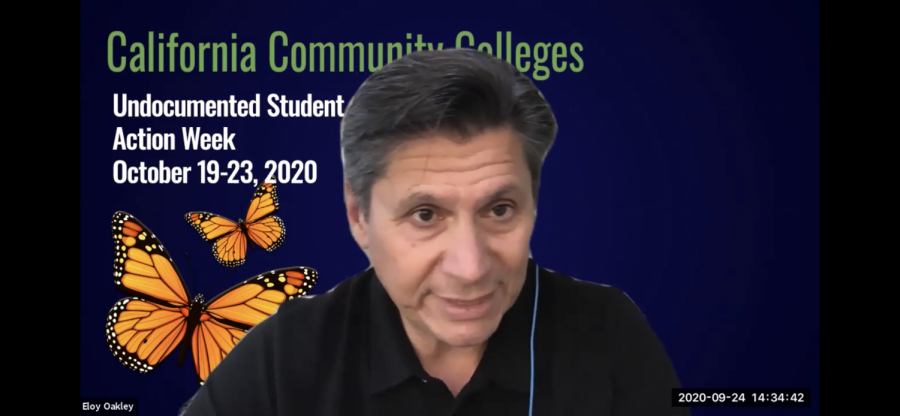CCC chancellor addresses student media in quarterly ConferZoom meeting
Eloy Ortiz Oakley touches on USAW, Election Day, and more
Quarterly Zoom press conferences with student media have become commonplace since the onset of the pandemic. (Screenshot by Thomas Cathey)
California Community College Chancellor Eloy Ortiz Oakley hosted the first scheduled quarterly teleconference meeting of the semester with CCC’s student media on Sept. 24, where he provided important updates for fall 2020.
Oakley began the press conference by mentioning the annual Undocumented Student Action Week (USAW), which will take place Oct. 19-23 . The purpose of the event is to spread awareness and provide extra support for the undocumented community college students in California, he said.
“We’re going to once again highlight the importance of the undocumented students in our population, challenges that they and their families face and continuing to press for action, both at the federal level and state level to continue to support our students,” Oakley said.
The chancellor also took time to stress the importance of the upcoming U.S. presidential election, which is scheduled for Nov. 3.
“It’s hard to watch the news these days,” Oakley said. “But the only way we’re going to change the narrative going forward, is if each of us shows up to vote. It’s critical to me, it’s critical for you as students, that we all make sure to vote on this election date.”
Oakley encouraged students to not just vote for a presidential candidate, but to also make sure to evaluate the other issues on the ballot. One issue Oakley specifically highlighted during the press conference was Proposition 16, which would end the ban on affirmative action in the U.S.
“Proposition 16 is something that I am very supportive of,” he said. “I hope that the board of governors, the UC board of regions, the CSU board of trustees have all endorsed Proposition 16. I’m not here to tell people why they should vote for or against it, I just want to make sure [students] are all aware of the importance of Proposition 16 to our future.”
Oakley says that he wants faculty and staff at institutions to reflect the diversity of students in the classroom.
“As our student body continues to be diverse, we want to ensure that we can do everything possible to support every student from every background and ensure that the faculty and staff that you visit with, that you see in the classroom, that you learn from, represent the diversity that you [students] bring to the classroom,” Oakley continued.
Oakley also brought up was the decline of enrollment rates between spring and fall 2020. He says that while enrollment for summer 2020 increased, mainly due to students taking classes they may have missed out on at the start of the COVID-19 pandemic, CCC enrollment has dropped 5 to 7 percent since the spring.
“We have launched a “Stay Enrolled” campaign from the California Community College Chancellor’s Office,” Oakley said. “We want to get the word out to every student, who’s either in college right now, left college during the spring or is thinking about going to college, this is the time to get enrolled and stay enrolled, and I know it’s tough.”
Before opening up for questions, Oakley addressed the death of George Floyd and the issue of racial injustice in America. In fact, the CCC Chancellor’s Office published a “call to action” letter in June, proving that they are dedicated to help solve this issue.
“We have to take hold of this moment and make sure we do everything possible to change the direction of systemic racism in our system and in our communities,” Oakley said. “We have challenged our college leadership, faculty and staff throughout the system to have an honest dialogue and reflection about where we are with race and ethnicity in our colleges, [and] to take stock and audit our classroom culture, to look at our law enforcement training and education programs and identify areas of the curriculum that we need to reform.”










